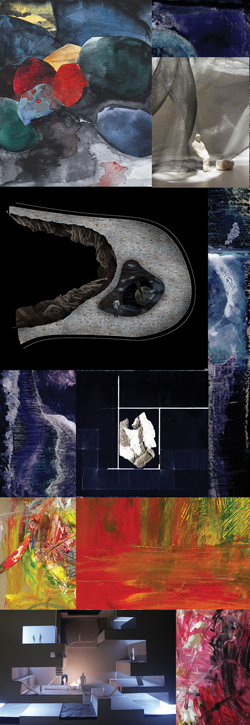Pilot 3 - Centre for Emerging Pedagogies in Higher Education
Complexity & Depth - Pilot 3
Complexity & Depth - Pilot 3
 Complexity & Depth focuses on the relationship between inner and outer aspects of the role of the professional, a professional education, and the learning process itself.
Complexity & Depth focuses on the relationship between inner and outer aspects of the role of the professional, a professional education, and the learning process itself.
An integral perspective
Complexity, in this context is about, the interrelationship and integration of different categories of seeing and understanding. For example, architecture is a highly transdisciplinary field and the specific character, strength and responsibility of the architect's role is to represent an integral perspective in the complex processes of environmental planning and design. To develop this multi-perspective understanding is a challenging task, because letting go of established and fixed perspectives is troublesome for most of us. This is something that the initiatives undertaken by this work package will try to overcome.
Deep structures
The influence and potential of unconscious aspects in creative work are well documented, but not much discussed or developed during a professional education. Intentions and conscious choices are crucial when developing all projects across many professions, but the processes that can lead to works increased quality and meaningfulness need to be nurtured by more than rational thought. Thus the creative process can be seen as a dialogue between rational considerations and the unconscious. Within architecture, the discussions and study of deep structures, the unconscious, have been the focus and point of departure for this work package.
Presensing
Sensibility is a physical, emotional and intuitive ability crucial in any aesthetic experience, creative work and social interaction. This is a very natural part of a creative professional education. When cultivated to a higher level, the awareness of what is going on inside can grow into a presensing; a way to discover solutions and potentials in situations where others see only problems. A creative professional education thus becomes more than a vehicle for a professional career; it is a way of self-exploration, a way of developing the whole person to become an influential actor in the problem-solving of our time.
Developmental integral aesthetics
A fundamental aspect of a creative porfessional education is to develop understanding and taste for form and aesthetic quality. But these qualities are hard to define and seem to change regularly, depending on time, socio-cultural context and individual preferences. Today there is a need for a pluralistic, all-inclusive aesthetic model or map, where quality can be discussed within a perspective of continually evolving aesthetic paradigms. This map will be a tool for orientation and communication across the full range of aesthetic preferences, from the layman to the expert.
